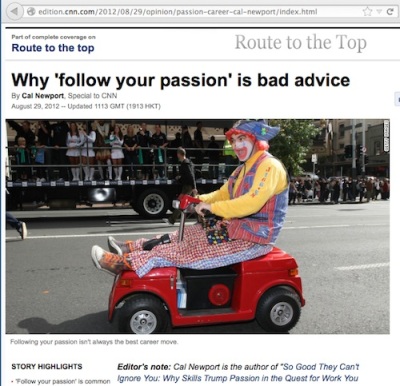
“Follow Your Passion” is bad advice. Do this instead…
I’m on a crusade to end these nonsensical ideas that sound logical, but actually make no sense whatsoever, and my new favorite “follow your passion”:
- “We need to educate people about the importance of eating healthy foods” (as if they don’t already know that eating 5 Big Macs is bad)
- “We need to teach people about the importance of financial literacy” (as if they don’t know they should be spending less and saving more)
“I need to find my passion!”
Would you please kill me right now? The “find your passion” idea is the kind of insipid, meaningless argument most frequently made by B-level speakers and middle managers who have nothing specific to offer. It’s just like “Keep a budget!” — an idea that sounds logical, but has no evidence to back it up. It simply doesn’t work.
In fact, passion is so deeply embedded in our culture that it’s one of our deepest invisible scripts. But if you’re honest with yourself…how has it worked out for you? You claim you need to find your passion…but has that worked for the last 6 months? Year? 5 years?
It’s as if we’re just waiting for our passion to fall from the sky…THEN we’ll know what to do with our lives! Of if we make yet another list of what we love…suddenly, we’ll know what job we want! Where we want to live! And what our purpose for life is.
Here’s my take:
People love the “passion” idea because it allows us to wait for a mythical day where we find this elusive passion…and then ride off into the sunset on a white pony.
I prefer a different approach: Becoming world-class at something, then letting the passion follow.
So when I heard my friend Cal Newport had independently come to the same conclusion…and in fact, he was writing an entire BOOK on this idea…I knew I wanted to hear his take on it.
Cal, who recently graduated with a PhD from MIT, has unconventional takes on so much of the typical “expert advice” that you read.
Also, he is unintentionally hilarious. When he came to hang out in NYC recently, I took him to this place that only models work at. When we sat down, I said, “Notice anything?” He looked around, confused. I pointed at some of the staff, saying, “Look at them. What do you notice?” He stared back at me with vacant eyes. After I explained how EVERY SINGLE ONE OF THE STAFF WERE MODELS, he just looked at me. “Dude, I’m married. When I walked in here, I was noticing how nice the curtains are.”
HAHA.
Cal’s last guest post was one of the most popular on this site: Time management: How an MIT postdoc writes 3 books, a PhD defense, and 6+ peer-reviewed papers — and finishes by 5:30pm.
And today, to celebrate his new book, he’s written a terrific unconventional piece on how passion is overrated…and the importance of becoming so good they can’t ignore you.
Take it away, Cal.
* * *
Here’s something that confuses me. One of the most important factors in creating a satisfying life is developing a career you enjoy. And yet, our national conversation on this complicated issue is laughably simple. We are, it seems, forced to bow down at the altar of an annoying little phrase:
“Follow your passion.”
This slogan presents an absurdly reductionist explanation for how people end up loving what they do for a living:

But even though this advice is simplistic, I can tell you from experience that people do not appreciate any dissent. Consider, for example, a piece I recently wrote for CNN with the pithy title: “Why ‘Follow Your Passion’ is Bad Advice”

This piece quickly generated 100 comments with a clear theme: People hated the title. (Perhaps the first sign of trouble was the accompanying photo of what appears to be a child-eating serial-killer clown.)
Here are two examples of the reaction I generated:
After reading this article, I realized that I should probably keep my job working on an assembly line sorting light bulb filaments…thanks for the advice, Cal!!
If all…people did as Cal Newport writes, we wouldn’t have Windows, Apple, Titanic and Avatar, and all programming would still be done with machine assembly language. Our society has a love affair with this reductionist notion that we all have One True Calling, twined in our DNA, waiting to be discovered. Questioning this premise, as demonstrated by the reaction to my CNN piece, is interpreted as a sign that you’re giving up altogether on the goal of enjoying life: follow your passion or end up on an assembly line!
I find this conformity ridiculous — the equivalent of a world where the only acceptable personal finance advice was: “a penny saved is a penny earned” (a recurring nightmare of Ramit).
Reality is more complicated. I recently spent a year researching and writing a book that rethinks common career advice. I studied people who love what they do for a living. I didn’t ask them for catch phrases. Instead, I dove deep into the details of their stories to find out exactly how they built passion for their careers.
Here’s what I found: few people have pre-existing passions that can be transformed into a career. Furthermore, there’s little evidence that matching a job to an existing interest is an important source of satisfaction.
I fully embrace the goal of feeling passion for your work. My research, however, shows that achieving this goal is more complicated than simply identifying your calling and going after it. Put another way, if you line up 10 people who are passionate about their jobs, 9 out of this 10 will likely tell you that they never could have predicted where they are today. The path toward passion is simply more complicated than a simple slogan like “follow your passion” allows.
So I’m fighting back.
Below is a more nuanced alternative to this catch-phrase — a systematic approach based on observation and evidence:

Let’s walk through these steps…
Step 1: Identify a Target Lifestyle (not a Target Job)
The first step of this process is identifying some general lifestyle traits that resonate with you. Some people seek extreme time affluence and autonomy in their schedule. Others want power, energy, and respect.
In my new book on this topic, for example, I tell the story of two women who ended up loving their work, but pursued quite different target lifestyles. The first case study, Lulu, valued time affluence. She turned down multiple promotions during her career so that she could strike out on her own as a highly-valued freelancer, taking months off between contracts to travel (she has family in Asia) and pick up new skills (she earned her pilot license, among other pursuits, during these breaks).
The other case study, Pardis, valued impact. Her career as a hard-charging young Harvard professor is intense, but it allows her to tackle a world-changing problem (she’s using sophisticated algorithms to help cure some of the world’s deadliest diseases).
Regardless of what traits resonate with you, the key word here is “general.” You’re not identifying a job or even an industry. Instead, you’re identifying a lifestyle. Notice that many, many different fields should be able to lead you to this target lifestyle.
Step 2: Find a Supporting Job (from Among Many Such Jobs)
The next step is to find a position that can lead you to your target lifestyle under the condition that — and this is the important part — you first become absurdly valuable.
This is a place where many people get tripped up. The traits that define these types of target lifestyles are rare and valuable. If you don’t have rare and valuable skills to offer in return for these traits, you’re not going to get them in your own life.
This is a key theme I encountered time and again in my research. In my book, for example, I tell the story of a young woman who dropped out of college to pursue her dream of starting a non-profit that would change people’s lives. It’s a noble sentiment, but she didn’t have any specific valuable skills relevant to this problem. Without valuable skills, no one will give you money. With no money, no non-profit. When I met her, she was struggling to make ends meet.
This young woman had the equation backward: you have to become really good at something valuable before you can obtain your target lifestyle. If I had met her a year earlier, I would have advised her to choose a job where she could hone skills that might be relevant to successfully running an organization of the type she had in mind.
Here’s what’s important here: Lots of jobs can probably lead you to your target lifestyle, assuming you satisfy the value condition. In fact, your current job might very well qualify. On the other hand, lots of jobs probably won’t get you where you need to be, so, you can’t just choose something blindly.
The key point here is to lower your threshold. You are certainly not looking for your “one true passion.” There will be many jobs that can provide the foundation for getting your target lifestyle, so don’t overthink this decision.
Ready to take control of your finances (without tedious budgeting?) Get the first chapter of Ramit Sethi's NYT Bestselling Book below.
Step 3: Cultivate a Rare and Valuable Skill
Now that you’ve identified your target lifestyle and have a position that can get you there, it’s up to you to earn it. As I just emphasized above, the linchpin in your quest for a compelling career is becoming excellent. I’m not talking about show up on time and do what you’re told in a timely fashion performance, but instead I’m talking about your employer will do whatever it takes to keep you performance.
This goal is easy to understand to but hard to accomplish. Most people who claim they want to be excellent end up instead replying to e-mails and reading online marketing blogs. Stars, by contrast, identify a small number of specific skills that are demonstrably valuable to their field, and then set out training these skills like an athlete or musician.
His training often embraces the principles of deliberate practice and is not necessarily all that fun.
At a high-level, this type of systematic skill development requires three steps:
Identify the specific skill you’re developing and a metric that tells you clearly how good you currently are with respect to this skill. As a professor, for example, I focus on my ability to produce theoretical breakthroughs. My metric is number of publication in highly-competitive peer-reviewed venues.
Stretch yourself. A key factor for this style of practice is that you push yourself beyond where you’re comfortable. You’re not looking for a flow state. You’re instead looking for the intense concentration of tackling something slightly beyond your current skills level (a key distinction). Returning to my professor example, I often force myself to dive into a result or technique that I don’t yet understand and that uses mathematics I haven’t yet mastered. This can be really frustrating, and I can only do it for an hour or two at a time. But during these hours, my skills take immense leaps.
Seek (harsh) feedback. The final stage of this style of practice requires that you pinpoint exactly where you’re weak so you can focus your future stretching where it’s most productive. As a professor, I take the negative reviews of my work seriously (recall, everything I do is submitted to intense peer review). I also like to look to the papers that end up doing better than my own and then try to figure out why. If I publish at a conference and another paper wins best paper, I study that paper to find out why it was better. I want a crystal clear understanding of exactly what needs to be improved, and to what point, in order for me to get to a next level.
Step 4: Leverage your Value
Once you’ve built up rare and valuable skills you need to then use them as leverage to gain the traits you originally identified in your target lifestyle.
There’s a lot of chatter about “courage” surrounding discussions of building a more remarkable life: this is where that courage matters. Your target lifestyle is valuable for you but not necessarily valuable for the rest of the world. Therefore, no one is going to make it easy for you to make that transition. This is where you might end up, for example, in a hard negotiation with a boss who wants you to cash in your skills for more money (and more hours) whereas you want to leverage it to work from a cabin.
If you don’t recognize the potential difficulty of this step, you’re in danger of ending up a very valuable workaholic; respected but miserable. This is where it helps to have the clear the picture of your target lifestyle from Step 1. At every major decision point in your career, ask if brings you closer or farther from getting to your target lifestyle.
Returning to my example of Lulu, the freedom-loving database developer introduced above, there were times in her career where it made sense to take on more responsibility. She started in QA testing. Her first move was to automate much of the testing for the company, which earned her a promotion to help roll out this system. This was a good promotion because it helped her build her first reservoir of valuable skills. A few years later, however, she was given the opportunity to move into a management position. She turned down this promotion because it didn’t develop any skills that were relevant to being to work as a successful freelancer.
Conclusion
Feeling passion for your work is a great goal, but identifying a passion in advance, and then matching it to a job, is not a consistently replicable way of achieving this goal. You shouldn’t follow the advice “follow your passion.” The better strategy is to work backward from a target lifestyle, pick a supporting job, cultivate a skill, then leverage your value. If you study people who really do love their careers, you’ll find that most used some variation of this strategy as the foundation for their happiness.
“Follow your passion” is a nice slogan, but we need more than slogans: we need systems, supported by evidence, that actually work. It’s time to start talking about career development like adults. If we don’t, the clown might get us.
Cal Newport is a writer and an assistant professor of computer science at Georgetown University. His new book, So Good They Can’t Ignore You: Why Skills Trump Passion in the Quest for Work You Love, takes a contrarian look at popular career advice. He also runs the blog Study Hacks: Decoding Patterns of Success.
Ready to improve your habits and level up your life? Download our FREE Ultimate Guide To Habits below.
Written by Ramit Sethi
Host of Netflix’s “How To Get Rich” NYT Bestselling Author, & Host of the I Will Teach You To Be Rich Podcast. I’ll show you how to take control of your money with my proven strategies so you can live your RICH LIFE.



